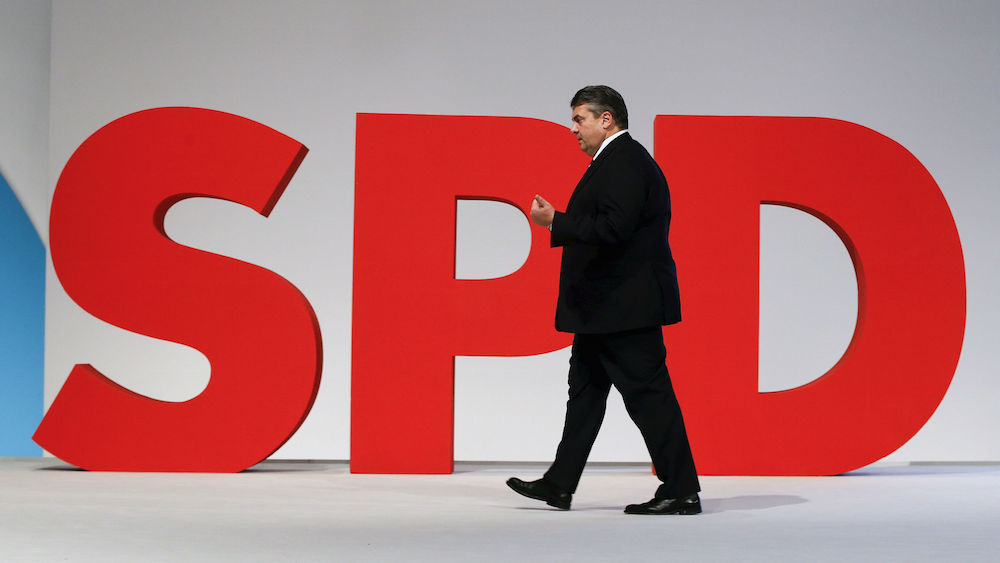Twenty years ago, Germany’s Social Democrats polled at forty percent. These days the party is struggling not to drop below twenty percent. The SPD is squeezed between Merkel’s centrist CDU party, the hard Left Party, and right-wing AfD populists – and even correcting past “errors” offers no return to winning ways.
Germany is a long way behind the United States when it comes to political data-crunching. But a first attempt this week – computer-aided analysis of party manifestos – threw up interesting results.
The analysis by Berlin’s Idalab, a group of mathematicians and IT specialists, suggested that Angela Merkel’s Christian Democratic Union (CDU) is now far more center than right. And Merkel’s grand coalition partners, the Social Democratic Party (SPD)?
The most remarkable thing about the SPD program, they said, is that there is nothing remarkable about it. The SPD manifesto, the analysis tool said, showed “absolutely no clear statements.” Or, to use a beloved phrase from the comedy show “Little Britain”: computer says no.
The computer is not alone. German voters have been saying no to the SPD for years. It stormed to power in 1998 when Gerhard Schröder secured 40.9 percent support. But the party has been in decline ever since, losing half of its voters and now bobbing along at 20 percent in polls.
It is a truism that politics is a cruel business but, in recent years, politics has been particularly cruel to the SPD, which, since the party lost power in 2005, is licking wounds of Third Way politics that refuse to heal. The peak of SPD market-friendly social democracy came a little over a decade ago when Chancellor Schröder forced his party – and the country – to swallow some tough medicine. The social and economic reforms, dubbed Agenda 2010, were necessary to revive the ailing German patient, at that point sometimes termed the “sick man of Europe.” “Either we reform ourselves,” Schröder warned his mutinous party ahead of the Bundestag vote, “or the market will reform us.”
The medicine worked, according to economists. But the reforms cost Schröder his job and many SPD voters saw them as a betrayal of workers. A decade on, a survey out this week showed that just one third of voters believe social justice – historically the SPD’s unique selling point – is still a core party competence.
Merkel Taking Credit
The reforms were only the start of the SPD’s misery. By the time the economy turned around, Angela Merkel was chancellor, the SPD suddenly her coalition junior partner. Merkel happily took political credit for the recovery while ensuring the blame for the reform “betrayal,” and for many unintended consequences, stuck to the SPD.
On the opposition benches after the 2009 election, the tormented SPD began drifting to the political left again until party leader Sigmar Gabriel had second thoughts. Disowning the reforms by marching left, he said, would only compound the SPD’s credibility problem. The more realistic survival option was to stick to the political center and, when back in power, work to correct the most egregious effects of the reforms.
That is what it has done since 2013, in its second grand coalition with Merkel’s CDU. Last year the SPD pushed through a €8.50 statutory minimum wage – against a noisy lobbying campaign that the party’s demand would break the economy. Those dire warnings are long forgotten but so, too, is the party behind the minimum wage.
This week the SPD pushed through another core promise to voters: forcing companies to pay contract employees the same as full-time employees. Again, this was a key SPD voter promise in the last election and closed a loophole opened through Schröder-era labor market deregulation. But that may be the problem. Many SPD officials appear unable or unwilling to take full credit for their political breakthroughs because, in their heart, they see these political victories as an indirect admission of failure, a reminder of the disgrace of Agenda 2010.
Another problem for the party is their energetic leader, Sigmar Gabriel. The good news, senior party figures say, is that he has many ideas on how to turn around his party. The bad news, they groan, is that he has at least one big idea a week.
What is the SPD For?
On Monday was his latest idea, a “Values Conference” to discuss “new and old questions for Social Democracy”. But the biggest question went unanswered: what, in the year 2016, is the SPD for?
That identity question is haunting center-left parties around Europe as they grapple with a decline in traditional, class-based voter affiliation and the disappearance of the classic working class milieu. The rise of fleet-footed populist parties, all pursuing hybrid social-national agendas, has catalyzed the decline of European social democracy.
On Monday, Austria’s Social Democratic (SPÖ) chancellor Werner Faymann became the latest victim of this decline. Gabriel insists he won’t be next, but faced damaging rumors last weekend that his days as party leader are numbered.
A year before Germany enters federal election mode, Gabriel faces a thankless, hopeless task. His party is squeezed on one side by Merkel’s centrist CDU, on the other side by the hard Left Party. Peeling off voters, too, is the neo-populist Alternative für Deutschland (AfD). The SPD’s only growth area, it seems, is voter frustration.
Sharing a stage with Gabriel at Monday’s SPD “Values Conference”, cleaning lady Susanne Neumann delivered a devastatingly frank assessment of the SPD’s labor and welfare reforms: “shitty contracts” that condemned workers to low-pay, casual work with few benefits.
“You ran us down,” she said. “Why should I vote for a party that did that to me and gives me no answers?”
Why indeed.







